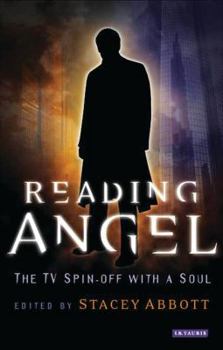Reading Angel: The TV Spin-Off with a Soul
Select Format
Select Condition 
Book Overview
In 1999, Joss Whedon spun-off the vampire with a soul from Buffy the Vampire Slayer into his own Angel . Recast in L.A., Angel developed its own preoccupations, exploring a darker vision of... This description may be from another edition of this product.
Format:Paperback
Language:English
ISBN:1850438390
ISBN13:9781850438397
Release Date:October 2005
Publisher:I. B. Tauris & Company
Length:265 Pages
Weight:0.85 lbs.
Dimensions:0.8" x 5.5" x 8.5"
Customer Reviews
3 ratings
Essays and Analysis of a Supernatural Soap Opera
Published by Thriftbooks.com User , 18 years ago
Stacy Abbott has done a wonderful job assembling a diverse set of essays into a very readable book for fans of Joss Whedon's ANGEL. The diversity of writers with different voices and opinions come together here to analyze and comment on subjects such as: gender politics, film noir elements, humor (in it's many forms), cinematic language, and music as a narrative agent. If any of these areas spark your interest, I would suggest picking up this book and giving it a read. It may sound very academic, but while I found the essays a large step up from the usual fan writing in both tone and content, they are still highly readable and very enjoyable.
Reading Angel
Published by Thriftbooks.com User , 18 years ago
Not a bad read for the dedicated Angel fan. I really enjoyed it. Some of the articles were a bit of a heavy read but entertaining. Worth reading.
Beginning the critical investigation of "Angel"
Published by Thriftbooks.com User , 18 years ago
"Reading Angel: The TV Spin-off With a Soul" is a collection of essays by academics from mostly the U.K. edited by Stacey Abbott, a Lecturer in Film and Television Studies at Roehampton University. Abbott does the introductory essay, "Kicking Ass and Singing 'Mandy': A Vampire in LA," that covers a lot of ground in touching on the moral ambiguity of Angel/Angelus, the elements of contradiction and self-parody, and the generic hybridity and Angel's visual style. That certainly gives you a sense of the scope of topic covered in these essays. More importantly, if you are not an academic, you should still be able to look at those topics and figure out what most of them are going to be about. After all, you do not need advanced degrees to recognize things like moral ambiguity and self-parody on "Angel," although generic hybridity might take some thought. On balance, fans of the late lamented WB series will find insights of interest in most of these chapters, although be forewarned there are some points where these academics dive into the deep end and start throwing names and theories around fast and furious. Part One, "It Was a Seminal Show Cancelled by the Idiot Networks": Narrative and Style on "Angel": (1) "'Angel': Redefinition and Justification through Faith" by Phil Colvin looks at the character of Faith as being paradigmatic of the show and the character's mission statement; (2) "'Ubi Caritas'?: Music as Narrative Agent in 'Angel'" by Matthew Mills is a cursory look at the pivotal role music played in the show; (3) "Transitions and Time: The Cinematic Language of 'Angel'" by Tammy A. Kinsey looks at the visual transitions, prophetic visions and other cinematic experimentations, proving that there were was logic and significance to all those high speed montages; and (4) "A Sense of the Ending: Schrodinger's 'Angel'" by Roz Kaveney looks at senses of ending provided by the final season and episode, taking into consideration the possibility of a sixth season or future television movies. Part Two: "The Big Wacky Variety Show We Call Los Angeles": The City of "Angel": (5) "Los Angelus: The City of Angel" by Benjamin Jacob details how elements of the real L.A. are combined with those from film noir, ; (6) "Outing Lorne: Performance for the Performers" by Stan Beeler examines the character as the microcosm to the macrocosm of the L.A. entertainment industry as well as high camp, and (7) "'LA's got it all': Hybridity and Otherness in "Angel"'s Postmodern City" by Sara Upstone considers the city as representing the Other, which makes it ideal for the a vampire with a soul. Part Three: "Hell Incorporated": Wolfram & Hart's Big Bad: (8) "Gender Politics in 'Angel': Traditional vs. Non-Traditional Corporate Climates" by Janine R. Harrison contrasts how Lilah Morgan and Kate Lockley function in traditional corporate climates while Cordelia Chase and Fred Burkle become actualized in non-traditional corporate climates; (9) "The Rule of Prophecy: So





